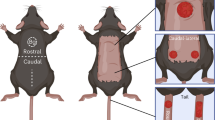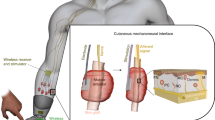Abstract
THIERSCH grafts of tail skin from 30 mice of various strains and both sexes were implanted intracerebrally in an attempt to produce an expanding, space-occupying, intracranial lesion, and to investigate its effect on the surrounding brain, with particular reference to ‘cerebral oedema’. The autografts, which were cut with a Castroviejo keratome set to a thickness of 0.2 mm, measured approximately 3 mm × 1 mm. Immediately after removal they were inserted into the right cerebral hemisphere with a blunt probe, through a small hole made over the lateral aspect of the skull with a dental burr. All operative procedures were performed under ‘Nembutal’ anaesthesia.
This is a preview of subscription content, access via your institution
Access options
Subscribe to this journal
Receive 51 print issues and online access
$199.00 per year
only $3.90 per issue
Buy this article
- Purchase on Springer Link
- Instant access to full article PDF
Prices may be subject to local taxes which are calculated during checkout
Similar content being viewed by others
References
Spencer, A. T., Ann. Rep. Brit. Emp. Cancer Campaign, 46, 404 (1962).
Author information
Authors and Affiliations
Rights and permissions
About this article
Cite this article
SPENCER, A., THOMAS SMITH, W. Behaviour of Intracerebral Autografts of Mouse Tail Skin pre-treated with a Single Application of 20-Methylcholanthrene. Nature 207, 649–650 (1965). https://doi.org/10.1038/207649a0
Published:
Issue Date:
DOI: https://doi.org/10.1038/207649a0
This article is cited by
-
Do animal models of brain tumors replicate human peritumoral edema? a systematic literature search
Journal of Neuro-Oncology (2023)
Comments
By submitting a comment you agree to abide by our Terms and Community Guidelines. If you find something abusive or that does not comply with our terms or guidelines please flag it as inappropriate.



